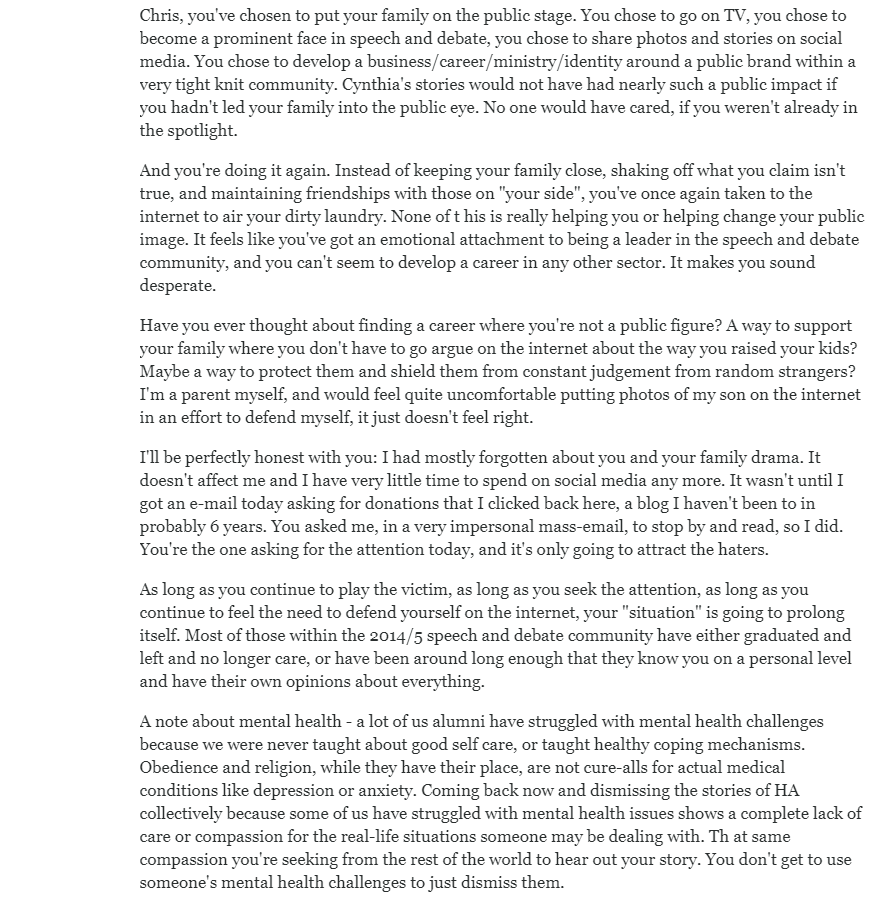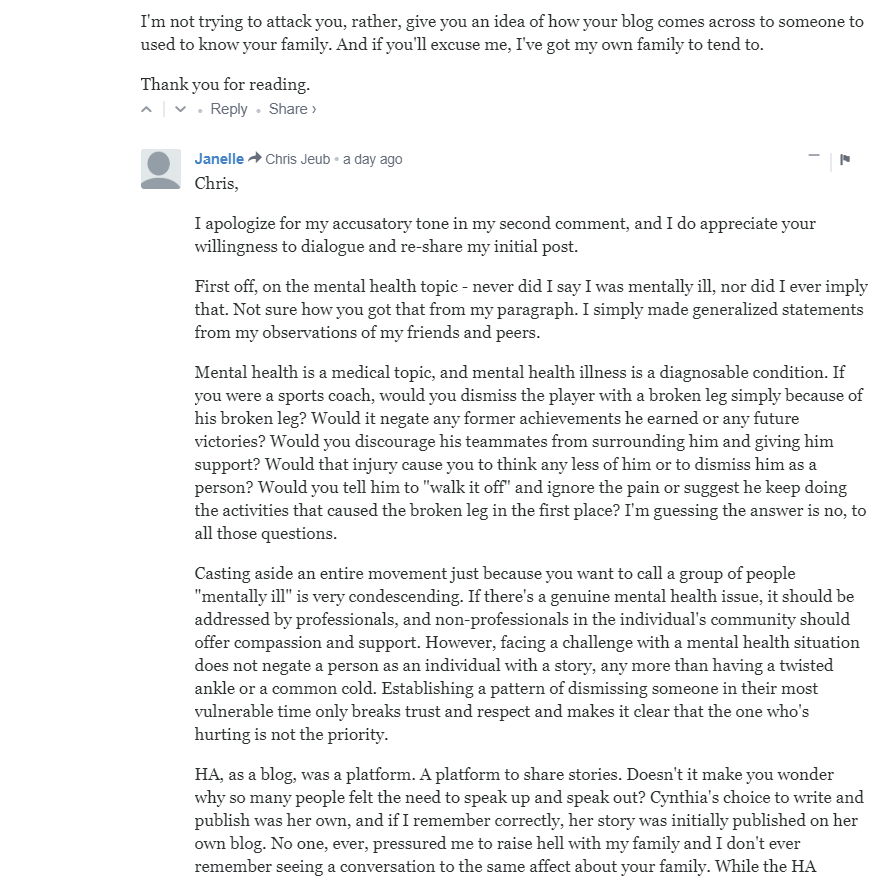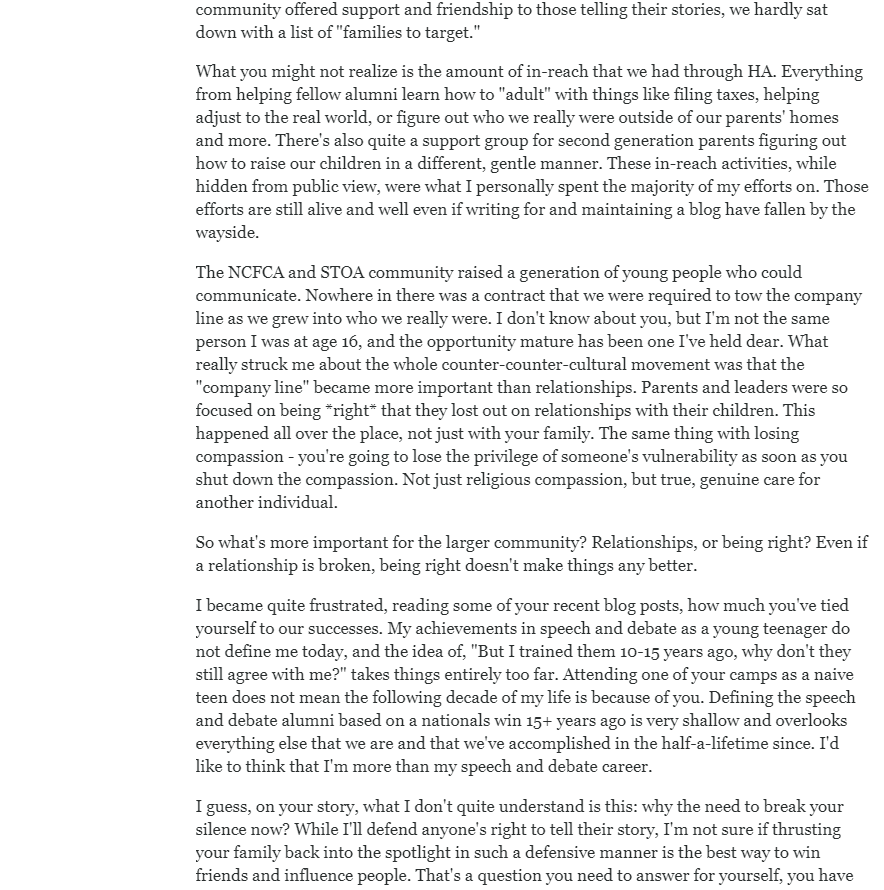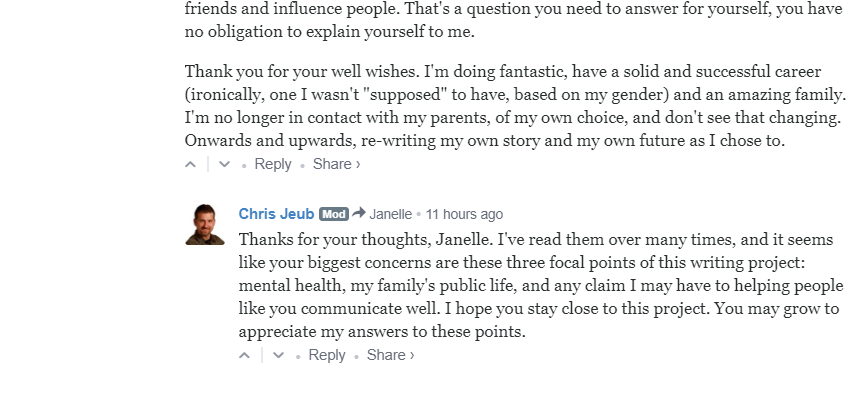Abusers don’t like being held accountable for their actions. One of the best ways to keep an abuser from holding power is to expose their true nature. This is what I set out to do in 2014, when I first revealed to the world that my parents had been emotionally, psychologically, and physically abusive toward myself and my fifteen brothers and sisters. Leading up to that point, our secrets were kept within the family. I broke the taboo because I had nothing left to lose after my parents said I couldn’t see my siblings anymore, using the children I’d raised as leverage against me.
This March, I had the opportunity to tell the whole story in Huffington Post Personal, in cooperation with the Economic Hardship Reporting Project. A few weeks later, my dad began publishing a response defending his reputation and tearing down mine. I have spent the months since thinking about if I should respond, why it might matter to respond, and whether a response will heighten tensions. I concluded that I don’t owe anyone a response, nor do I owe anyone my silence. I will continue to tell the truth and work on telling my story to the best of my ability.
I don’t presume to know exactly what is going on inside my dad’s head. While I am speaking of specific scientific findings in this post, I can’t say with precision what level of awareness he has about his own actions. I can only observe the patterns of behavior and protect myself from being abused, and help others to recognize what abuse looks like.
At first, my dad wrote with apparent compassion toward me, saying that he had no idea how I could concoct such “false memories.” Since then, however, I’ve been painted increasingly as the villain. Over the past three months, he’s grown increasingly bold in his stance, demonizing me for outright lies, libel, and what he’s calling “social smearing.” He claims that he is on the side of love, and that he is “Facing Hate,” the title of an upcoming book he’s writing about how much my rebellion has hurt him.
It is unclear exactly what he is disputing, because he hasn’t gone into detail. His phrasing was already patriarchal, the man of the family speaking for the rest of them: “The Jeubs are not and have never been a family of abuse.” As if a family can be “of” something, like families have brands and mission statements like businesses. Rather than speaking as an individual, my dad insists on hiding behind the family to make this statement. This silences the individuality of his children, making them all into poster children for whatever he wants to say. It also assumes that I’ve opposed my siblings as well as my parents, which isn’t the case. To a man like my father, children are products – assets, as he likes to say. The family does not need vindication from my allegations. My siblings were the victims, not my parents.
Later in that post, he wrote, “At first, some in our family supported Cynthia, and our family was fractured.” I wanted to know, why would any of my family have supported me, if everything I said was lies? Further, what specifically was he denying as false? He has called my claims “far-out and bizarre,” and “unbelievable.” Every claim I made was not an unbelievable one, but similar examples can be found in countless families like mine. My Huffington Post article mentioned his book “Love in the House” pretty early on, and he’s still promoting that, while insisting what I wrote was “fabricated. All of it.”
DARVO
At first, these posts had the effect of making me doubt myself. I spent a couple of weeks in a fog of confusion, my dad’s words dancing around my head, disturbing my sleep and emotional stability. Then someone sent me the science of what was happening: a phenomenon called DARVO. Here’s the definition from the pioneer of this research, Jennifer J. Freyd, PhD:
“DARVO stands for ‘Deny, Attack, and Reverse Victim and Offender.’ The perpetrator or offender may Deny the behavior, Attack the individual doing the confronting, and Reverse the roles of Victim and Offender such that the perpetrator assumes the victim role and turns the true victim — or the whistle blower — into an alleged offender. This occurs, for instance, when an actually guilty perpetrator assumes the role of ‘falsely accused’ and attacks the accuser’s credibility and blames the accuser of being the perpetrator of a false accusation.”
My dad’s pattern followed DARVO precisely. He denied everything I had to say, with vague blanket statements. He attacked and demonized my mental state, my credibility, my integrity, my character, and my lucidity. Then he reversed victim and offender, making himself into the victim in the situation. According to his blog and Patreon, he’s suffered like Jesus over my writing, endured an onslaught, had his reputation ravaged, and more.
As written on the University of Oregon’s website[1]:
In a 2017 peer-reviewed open-access research study, Perpetrator Responses to Victim Confrontation: DARVO and Victim Self-Blame[2], Harsey, Zurbriggen, & Freyd reported that: “(1) DARVO was commonly used by individuals who were confronted; (2) women were more likely to be exposed to DARVO than men during confrontations; (3) the three components of DARVO were positively correlated, supporting the theoretical construction of DARVO; and (4) higher levels of exposure to DARVO during a confrontation were associated with increased perceptions of self-blame among the confronters. These results provide evidence for the existence of DARVO as a perpetrator strategy and establish a relationship between DARVO exposure and feelings of self-blame. Exploring DARVO aids in understanding how perpetrators are able to enforce victims’ silence through the mechanism of self-blame.”[3]
It was especially number (4) from the paragraph above that made me realize what was happening inside my head. I was responding to the tactic with self-doubt, which is a consistent behavior when faced with DARVO from a perpetrator of abuse who’s been called out. It was a natural reaction, and that helped me understand that my doubts came from repeating a pattern of abuse I’d been groomed for. This self-doubt manifested in many forms, and I worked on them in my EMDR therapy sessions. I turned to friends and my partner for comfort and reassuring words, helping me to believe in myself while my head spun. I was angry that he could make me cry again. I was frustrated that he could get inside my head and plant confusion there. I felt unsafe, knowing that he can still reach my mind from afar, even if I’ve moved away and done my best to move on from the family and their ideology.
My dad was and is attempting to gaslight me from afar, via the internet. And it was working, because it was making me question my own sanity, even though I was and am surrounded with people who support me. It took a few weeks to regain my footing, to have control of my mind again, instead of being trapped in a state of shock and confusion. During this time, I carefully examined the facts again, checking my knowledge against what was being presented as the unvarnished truth.
False Memories and Mental Illness
It stuck with me for some time that my dad had accused me of concocting false memories. Well, had I? I asked myself. Especially because I spent over two decades being groomed specifically to go along with his specific form of psychological abuse, these blog posts sank through my skin, reminding me again how he uses words to hurt and abuse. As demonstrated above, abusers will attempt to undermine anyone who tries to hold them accountable for their actions. This alone should defend me against the accusation that I’ve produced false memories, but there’s a lot of interesting research on the subject. In the 90s, there were famous “memory wars” going on in the field of psychology, with countless people “remembering” abuses and even extraordinary events, like being abducted and prodded by aliens. How is one supposed to sort truth from falsehood, when memories are so hit-and-miss?
For information on this, I turned to the work of Bruce Perry, Ph. D. A child psychologist, he was called upon to sort through a case of mixed memories. In his book The Boy Who Was Raised As A Dog, he breaks down exactly how he went about conducting interviews and gathering information about what happened. The situation was what he titled “Satanic Panic,” and many children were telling mixed stories of “real” memories. Perry sorted out what was truth by discovering one crucial detail: that the children had been tortured by their caregivers, forced to relay stories of what they had never experienced. This information allowed him to sort out what had really happened. He observed that while some of the stories were told as if they were events being remembered, others were told with blank expressions, repeating details as if they’d been memorized. This process took 22 pages to explain, so I highly recommend the book to anyone who is interested in reading more about it.
I have never been quiet about my own mental illness. I suffer from Complex PTSD, anxiety, and depression. Growing up, I did not understand that mental illness comes in many forms, nor that having a mental illness isn’t the same as someone being “crazy.” I didn’t know this because my parents didn’t know it, and my parents were my only teachers. Today, my dad still lives under the assumption that calling someone mentally ill is an effective way to discredit them. This is not the case. You are not any less trustworthy, valid, or credible if you have a mental illness. My dad’s attempts to discredit me are ad hominem attacks, using as a personal attack something that doesn’t even discredit me.
Deplatforming, Doxing, and the “Social Media Mob”
Deplatforming is a nonviolent way to disempower the powerful. It is not at all like doxing, which involves leaking people’s personal information, exposing them to hate speech and death threats, including threats to personal safety. Deplatforming can, however, have an impact on the individual’s ability to continue using their name and influence to continue generating revenue or spreading hateful messages.
Because he is an abuser, my dad deserved to be deplatformed. He had a reputation that he’d worked hard to build, as a trusted debate coach and parenting author. While preaching a message of “love in the house,” he has no idea what love really is. For him, God is the ultimate definition of love, which makes it an ultimately meaningless word. For him, love does not have to include acceptance of or accountability to others. I wanted to reveal his hypocrisy to the world, and in telling the truth about my childhood memories – the good and the bad instead of just the good – I successfully removed him from the platform he did not deserve.
He has not been doxed or had an “online mob” sent after him. A legitimate series of examples of actually being targeted by falsehoods can be found here. Here are several comments, including some of his own, that he recently deleted. These are, to him, what constitute the “social media mob” that I’ve apparently sent after him.
Book Three
Now that I have fully explained myself, I want to add one more piece of information. This book that my dad is writing, tentatively titled “Facing Hate: Dealing with social smearing from the people you love” is not the first book he has written about one of his rebellious children. I am his third daughter, and my two older sisters also had books written about their particular rebellions. The first one is pretty obvious, being Love in the House. Published after we were on The Learning Channel in 2007, it details a “reconciliation” that my parents had with my older sister, and how the prodigal had returned to the fold. This didn’t last – to my knowledge Alicia still isn’t on speaking terms with my parents. The second one, their book Love Another Child, was written inadvertently at my second oldest sister, Alissa. She eventually relented and began having children, even though she never wanted to. This third book is about me, and is the most explicitly targeted one.
After processing all of this information, I believe it is safe to assume that my father is still abusing his children at home. The reason for this is that the abuser has two goals: (1) he must be allowed to continue his abuse, and (2) he must keep up appearances that he is not, in fact, abusing anyone. Whenever someone makes (2) impossible, (1) is at risk. This is why he is getting so defensive – he wants to continue hiding what happens inside that house. Again, I must say that how he personally views the situation is entirely different from how I do, and it is impossible to tell for sure what is going on inside his head. I am pointing out the patterns I see in this very public statement he has made about me, and calling it what it is: public gaslighting.
[1] https://dynamic.uoregon.edu/jjf/defineDARVO.html
[2] http://www.tandfonline.com/doi/full/10.1080/10926771.2017.1320777
[3] Harsey, S., Zurbriggen, E., & Freyd, J.J. (2017 — published Open Access). Perpetrator Responses to Victim Confrontation: DARVO and Victim Self-Blame. Journal of Aggression, Maltreatment, & Trauma, 26, 644-663.






